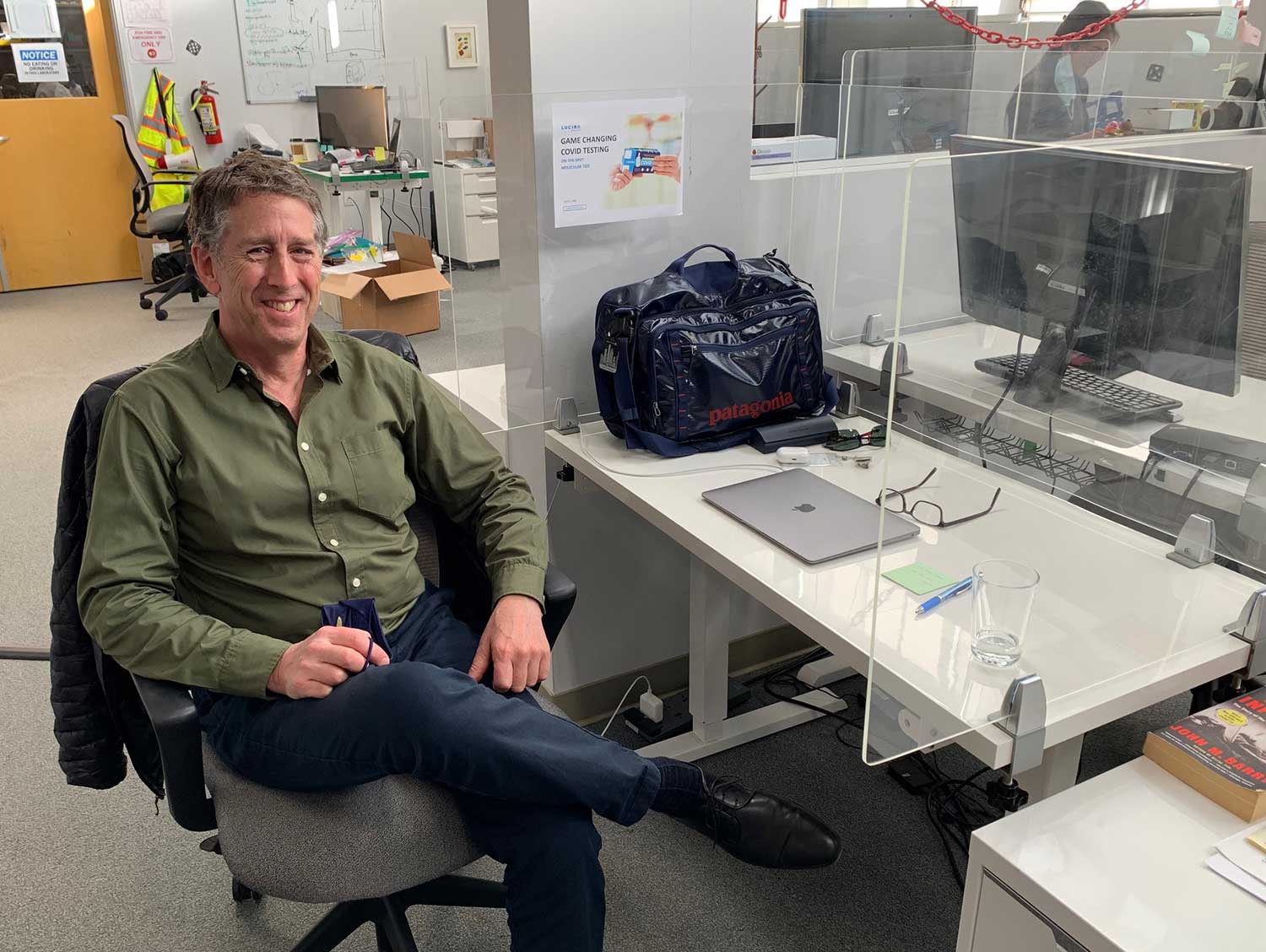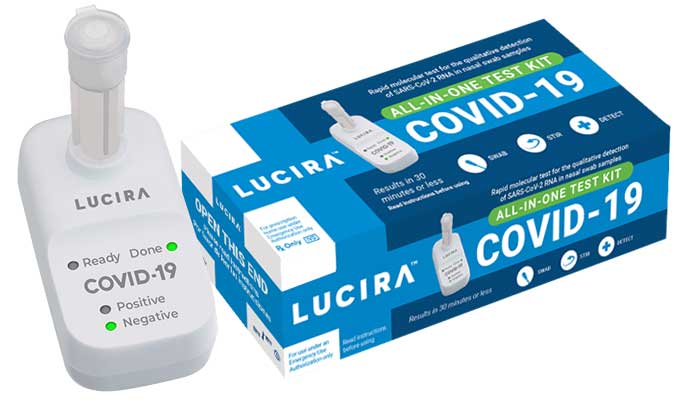Scientists Discover a New Signaling Pathway and Design a Novel Drug for Liver Fibrosis
Health & Behavior
By:
Published Date
By:
Share This:

Erik Engelson, a UC San Diego bioengineering and microbiology alumnus, is president and CEO of Lucira Health.
In November 2020, Lucira Health received emergency use authorization for the first rapid at-home COVID-19 test from the U.S. Food and Drug Administration. Erik Engelson, a UC San Diego bioengineering and microbiology alumnus, is president and CEO of Lucira Health, which was founded by UC Berkeley bioengineering alumni.

The Lucira COVID-19 All-In-One Test Kit is a molecular test that uses a simple nasal swab to return results in 30 minutes, anywhere, any time. The test is currently available by prescription in select medical centers. Engelson describes the test as a key tool, along with vaccines, in the arsenal required to slow the spread of COVID-19.
The test uses a real-time loop mediated amplification reaction, and works by swirling the self-collected sample swab in a vial that is then placed in the test unit. In 30 minutes or less, the results can be read directly from the test unit’s light-up display. The Lucira test is simple to operate and is completely self-contained for one-time use. Its accuracy is similar to that of PCR tests that are run in high-complexity central labs.
Engelson earned a bachelor’s degree in microbiology and a master’s in bioengineering from UC San Diego. He has led several medical device startups through to acquisition by companies including Medtronic and Stryker, was a partner at medical device incubator The Foundry, and is a venture partner at ShangBay Capital, to name a few career highlights.
He spoke about the process of getting the COVID-19 test kit through FDA emergency use authorization, his time at UC San Diego, and advice for students, in this Q&A.
Q: Lucira had been working on at-home test kits before COVID-19; what was the initial use case for this product?
A: The company was started in 2013, and I joined about two years ago. The original use case was for influenza. Just as central lab testing was extended to point-of-care (POC), Lucira’s technology is now extending POC to anytime/anywhere testing. From a public health standpoint, it is helpful to keep infectious individuals out of circulation. But how is one to know they are infectious if they can’t test themselves at home? With influenza for example, antiviral medications are generally effective only if taken within 48 hours of symptom onset. Many people don’t go to the doctor at all for flu, and when they do, it’s typically three to five days post-symptom onset, and by then it’s too late for an antiviral. As a result, it would be helpful both to individuals as well as the public health to be able to diagnose flu and other infectious diseases at home.
Q: When you and the Lucira team saw the COVID-19 pandemic developing, was there a decision to pivot and rapidly develop a test for this virus instead?
A: There was a pivot. Fortunately, the Lucira test platform is easily adapted to new assays (tests). Within months, our assay team demonstrated that they had developed an effective COVID-19 assay. This was then integrated into our test platform. Meanwhile, the pandemic was continuing, and the decision to prioritize the COVID-19 test was an easy one.
Q: What were some of the main challenges from an engineering and management perspective to getting the COVID-19 at-home test to and through FDA EUA?
A: I give the technical team huge kudos for the work they did in realizing the vision of transforming a central lab molecular diagnostic that runs on large machines, to a tiny, fully disposable handheld device. Significant thoughtfulness by the engineers and biologists who developed this product went into the design. My role was to build an experienced team of other important functions, including commercialization, clinical/regulatory, finance manufacturing/supply chain and quality, around the technical team. I also brought in additional capital. The transition from technology development to a commercial stage company can be challenging, but the risk can be reduced with an experienced team.
Because our test is intended to eventually be a consumer product, it was critical to not only have strong clinical and bench performance, but also to demonstrate that people of all backgrounds could successfully run the Lucira test from its simple, one-page instruction. This is known as usability testing, and significant effort went into creating easy-to-understand instructions along with a simple-to-use test.
Q: Looking back, were there any formative courses, research experiences, or student organizations from your time at UC San Diego that helped prepare you for this experience of rushing a product to FDA EUA in the middle of a pandemic?
A: Originally a New Yorker, my time both at UC San Diego as well as in La Jolla in general in earlier, quieter days was wonderful. UC San Diego was transformative for me in so many ways: socially, academically. I was lucky to find a perfect academic challenge. My biggest takeaways from the UC San Diego experience were a joy of learning and seeing the beginnings of what I was capable of accomplishing. These attributes remain with me today.
I studied microbiology as an undergrad followed by bioengineering in graduate school. The lab research was interesting, but I craved business. It was really the intersection of business and technology that interested me. It’s important to understand that every technical decision within a company also has a business element. How can engineers and scientists make these decisions if they don’t receive accounting and finance at a minimum? I am delighted that the Rady School of Management is there now, and the Institute for the Global Entrepreneur, the Basement, all these new programs to give students exposure to business and entrepreneurship. I would have loved to have taken business classes in my UC San Diego days—how great if current science and engineering students have this opportunity.
Q: Advice for students who want to work in the biotech industry or aspire to a role such as yours?
A: If there’s a chance of doing an internship for the summer in a company, that can be helpful and illuminating. And I would suggest that students take it upon themselves to find companies that could be of interest and just to reach out. Don’t hesitate, just reach out, even to the CEO. He or she will redirect the inquiry most likely.
When I was at UC San Diego, Hybritech was the only startup on the Mesa. I wrote to the CEO and I still have the response letter in which he stated that “we only have five employees right now, so we're not really set up for this”. That’s ok, and I greatly appreciated his reply. Just reach out, take it upon yourself. Exercise your entrepreneurial gene, and don’t expect the system to create opportunities for you. I know the university has programs to try and make connections and that’s great too, but just go for it, be a self-starter and create your own opportunities.
As you construct your resume and cover letters, emphasize not only technical skills but also the critical softer skills such as your experiences collaborating with others, natural leadership and followership skills, independent as well as group problem-solving. Examples always help. Failure is an important teacher, and insights from such experiences can be useful to convey.
Q: Lucira was co-founded by a couple of UC Berkeley engineering alumni. Why did you decide to get involved with Lucira, and what does this say about the UC system?
A: I always pick companies based on the people as well as the market, and the people at Lucira were just stellar. They had toiled for years on the challenging problem of developing the technology. One of the company’s investors recruited me to Lucira. My predecessor had done a really great job of positioning the technology and company.
The UC system rocks. It’s clear that investment in higher education feeds the economy. That’s exactly what we’re witnessing here, and we see it over and over. I am a proponent of higher education and California is lucky to have such an impressive university system.
Engelson is President and CEO of Lucira Health. He is a Trustee Emeritus of the UC San Diego Foundation; Initial Chairman of the Board of Trustees of UC San Diego’s Bioengineering Department; a member of the UC San Diego Division of Biological Sciences Dean’s Leadership Council; and an elected fellow of the American Institute for Medical and Biological Engineering (AIMBE).
Share This:
Keep up with all the latest from UC San Diego. Subscribe to the newsletter today.